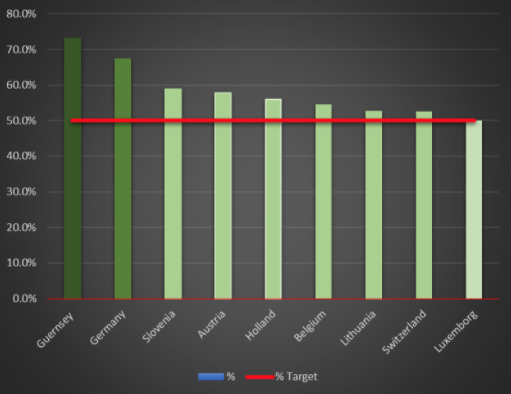In 2019, 73% of Guernsey’s household waste was sent for recycling or composting. This is an increase from 50% in 2017, the last full year before changes were implemented.
This is a fantastic achievement for Guernsey and the UK as it means the target of 70% recycling by 2030 has been exceeded in the first full year of the new waste strategy. These rates put the island way ahead of Germany, which saw the highest ‘municipal waste’ recycling rate of any EU country in 2018, at 67.3% according to the most recent equivalent figures.
Only seven of the 26 other European member states reported rates of more than 50% – Slovenia (58.9%), Austria (57.7%), The Netherlands (55.9%), Belgium (54.6%), Lithuania (52.5%), Switzerland (52.5%), and Luxembourg (50.1%).

How has this been achieved?
This rise in recycling is largely down to measures such as separate food waste collections which were introduced in 2018.
Over 3,100 tonnes of food waste was collected on the island in 2019 and sent to the UK, where it was then processed and eventually used to generate electricity and compost.
Richard Evans, States Trading Assets deputy managing director, has said that islanders can be very proud and that the response to the changes has been amazing. “This is a phenomenal achievement, and it is down to the effort and commitment that islanders have shown in the way that they manage their waste. Over the past two years, we have introduced new services, to help households recycle more, and a new way of charging, to provide some extra incentive to reduce waste. The response has been amazing, and we now have one of the highest recycling rates anywhere in the world – if not the highest.”
Guernsey saw over 16,600 tonnes of household waste being recycled or composted in 2019. This was an increase of nearly a third since 2017 (12,912 tonnes). General waste, consisting of materials not recycled or composted, more than halved from almost 13,000 tonnes to just over 6,000 tonnes.
Surely now it is time to adopt some of these practices on the UK mainland to improve Great Britain’s recycling rates as a whole?
Sources
BBC
Circular Online



